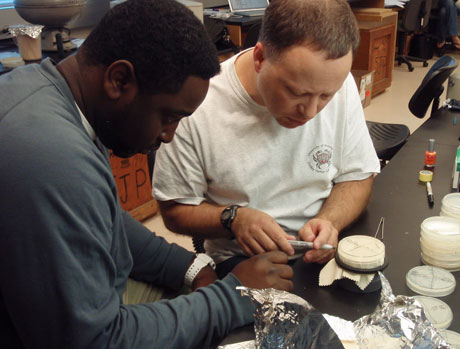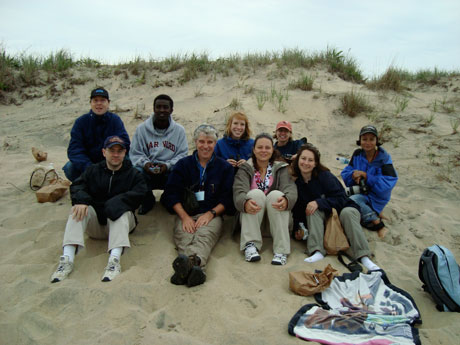MBL Awards Fellowships to Health and Environmental Science Journalists

Contact: Diana Kenney
508-289-7139; dkenney@mbl.edu
WOODS HOLE, Mass. – Thirteen science journalists have been awarded Logan Science Journalism Fellowships from the Marine Biological Laboratory (MBL), an international center for biological, biomedical, and environmental research and training and an affiliate of the University of Chicago.
 SJP Biomedical Fellow Onche Onde and Brad Shuster, co-director of the Biomedical Course, at work in the lab at MBL. Credit: Melanie DG Kaplan
SJP Biomedical Fellow Onche Onde and Brad Shuster, co-director of the Biomedical Course, at work in the lab at MBL. Credit: Melanie DG KaplanNow in its 28th year, the MBL’s Logan Science Journalism Program allows established science journalists from around the globe to “step into the shoes of the scientists they cover” by immersing them in hands-on research. This year’s fellowship, which runs from May 28 to June 6, offers journalists the choice between a Biomedical or Environmental research course.
The Biomedical Course plunges science and health journalists into the fascinating world of biological discovery that underpins many current approaches to biomedical research. Fellows will use both genetic model systems and marine invertebrates to gain exposure to fundamental techniques and concepts in cell and molecular biology. In addition, they will attend neuroscience demos and gain insight into neurodegenerative disease research, as well as some of the techniques fueling large-scale brain mapping efforts such as the national BRAIN Initiative.
Two of the Biomedical Course fellows, independent filmmaker David Jacobson and Warsaw-based freelance journalist Wojciech (Voytek) Mikoluszko, have been awarded Woods Hole Fellowships to spend an additional two weeks at the MBL participating in its renown Summer Courses. Mikoluszko will audit the MBL’s Neural Systems and Behavior course, and Jacobson will audit the Microbial Diversity course.
 SJP Environmental Fellows and Chris Neill (center), director of the Environmental Course, take a break from field work on Martha's Vineyard.
SJP Environmental Fellows and Chris Neill (center), director of the Environmental Course, take a break from field work on Martha's Vineyard.Environmental Course fellows will undertake field and laboratory research both at the MBL and at the Baltimore Ecosystem Study site in Baltimore, Md., a National Science Foundation Long-Term Ecological Research site. Fellows will use the Baltimore Ecosystem Study as a laboratory for examining how urban areas influence stream water quality, how residential development shapes plant communities, how lawns affect a region’s carbon stocks, and how emerging remote sensing technology can detect detailed patterns and changes of a city’s structure over time.
Following the Environmental Course, two of the Environmental Fellows, Los Angeles Times editorial writer Karin Klein and Codi (Yeager) Kozacek, a reporter for Circle of Blue, will travel to Alaska’s North Slope and spend one week with scientists pursuing field research at Toolik Field Station, including studies of global climate change.
Over the years, the Logan Science Journalism Program has granted fellowships to hundreds of journalists from prominent news organizations, including The New York Times, The Wall Street Journal, Science, National Public Radio, The Washington Post, USA Today, CNN, and Scientific American. Journalists from Africa, Brazil, Sweden, India, Japan, the United Kingdom and other countries have also received fellowships.
The Biomedical Hands-On Research Course is co-directed by Charles “Brad” Shuster of New Mexico State University and Phong Tran of the University of Pennsylvania Perelman School of Medicine. The course’s journalism director is Robin Marantz Henig, author of eight books and contributing writer, New York Times Magazine. The Environmental Hands-On Research Course is directed by Christopher Neill, director of the MBL Ecosystems Center. Science writer/producer Angela Posada-Swafford, a U.S. correspondent for Madrid’s Muy Interesante Magazine, is the Environmental Course’s journalism director.
The Logan Science Journalism Program is supported is sponsored in part by George & Helen H.B. Logan; Friends and Alumni of the Science Journalism Program; Golden Family Foundation; Howard Hughes Medical Institute; Irving Weinstein Foundation, Inc.; Ross Foundation; and Waksman Foundation for Microbiology.
The 2014 MBL Logan Science Journalism Program Fellows are:
BIOMEDICAL FELLOWS
Madeleine Amberger
Science Correspondent, Austrian Broadcasting Corp. (ORF)
Julia Belluz
Freelance Journalist, based in Boston, Mass.
David Jacobson*
Independent Filmmaker, based in Los Angeles
Wojciech (Voytek) Mikoluszko*
Freelance Journalist, based in Warsaw
Yves Sciama
Freelance Journalist, based in Grenoble
Eric Sorensen
Science Writer, Washington State Magazine
* Woods Hole Fellow
ENVIRONMENTAL FELLOWS
Catalina Arévalo
Environmental Correspondent, EFE News Service
Nick Clark
Anchor/Correspondent, Al Jazeera English
Karin Klein**
Editorial Writer, Los Angeles Times
Codi (Yeager) Kozacek**
Reporter, Circle of Blue
Susan Phillips
Energy Reporter, WHNY/National Public Radio
Fabien Tepper
Staff Writer, The Christian Science Monitor
Sarah Webb
Freelance Journalist, based in Tennessee
**Alaska Field Experience Fellow
—###—
The Marine Biological Laboratory (MBL) is dedicated to scientific discovery and improving the human condition through research and education in biology, biomedicine, and environmental science. Founded in Woods Hole, Massachusetts, in 1888, the MBL is a private, nonprofit institution and an affiliate of the University of Chicago.